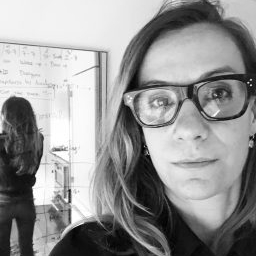Human Skin Covers Everything
Human skin covers everything.
Like a threadbare and lonely carpet; as if proper and common names held their organs together, their unequal temperament; as if the heterogeneous could be contained in the homogeneous, human skin covers everything: bridges that unite without masonry the three letters of the word río, luxurious unoccupied homes in cities that bite the outskirts of their need, battered elevators that always smell like bleach, public swimming pools and those cathedrals that shelter, under the surprised vehemence of their vaults, the sinew and ligaments of those who carried them on their shoulders.
When the bodies turn on their molar stones, they deliver the golden ratio of their own exhaustion, the toxins that sickened the bronchi, the dermis worn down by such transit: from the organic to the mineral, the one that sends a tumultuous proliferation of erythrocytes through the veins so that streams of freed blood open up in calcareous thickness.
As if there were hidden conduits, shadow corridors that never appear on the blueprints but furtively communicate with each other the exact machinery of the radius and ulna bones with the meager flow of poverty.
Compass that oppresses the musculature of the arm in its desperate afternoons so that skin becomes integument and protection, air capsule that envelops everything on its own precariousness and protects it from the eviction of living.
Nearby the tilde thunder trembles in the grisou and declarations of liberty, equality and fraternity get trapped under the hairnets of the female cooks. The Commune of Paris is so far away that it’s only an imaginary line, a so brief, blatant entry reluctant to disappear from the manuals.
But also in the neighborhoods of Madrid or Palencia, it is human skin that is first to burn and shudder. It doesn’t matter if it seems like the opposite.
Then the days or the bombs will fall, but just before that all-competing explosion, it will be the skin offering up its name until it dies. It doesn’t matter if it seems like the opposite.
Stones, tickets, soccer goals. Human skin covers everything.
That’s why my father’s hands, now that he’s aging, are tormented. They stiffen until the tendons become immobilized.
As I watch him fall into another time he becomes a bare block of concrete. The houses he has constructed, the time he has put up, the goods and roads he has built will outlast him because he has given his heart to that inflexible and unyielding task. He has donated his light, his consistency.
He has kept nothing for himself. No little shiny coin forgotten in his pockets.
The stone, in return, will offer him its immobility, the noble territory of the absent.
That’s why I know—it doesn’t matter if it seems like the opposite—that when his broken, incomplete and beautiful hands become just ashlars for the air, they will form mortar and joinery.
Index in which oxygen settles.
Father stone that has founded everything. Geology and song of the knuckles.
Inside the Earthworm, Nothing is Earth
Inside the earthworm, nothing is earth. Does she care about her name? Or the prudent certainty of taxonomies? The arboreal succession of Latin names that sink their roots into the softest earth?
When she moves, she advances into the invisible. Vibrating annelid, conjecture, clot of time surrounded by darkness. Her translation is soft and sinuous, accepting neither line nor triangle nor any mechanism of the rigid. She cannot imagine that species like us quarrel with our bones so violently. That we endure them with the resigned obstinacy of those who carry the full weight of the law.
In her body’s docile cylinder, earth flows endlessly in and out. But there is only undulation in her. The extraordinary response to changes in light. The flow in which she pursues her desire as if it were a shiny fish beneath the water that she can neither see nor catch with her hands.
And yet she does not feel any discontent. There is never any room for suspicion in her, only the tenacious thrust of the living towards all the forms of what is alive, the restless ebullition in what is unreadable.
When she descends fearlessly to the world, does she stumble over spilled blood? In Magenta or Nagasaki for example, in Cairo and Aleppo, in Srebrenica, does she soak, sticky, in that blood? In that boiling scream? In the raging channel where hate wets the dark skin of the fields like acid that gushes relentlessly? And in the cities, which kneel on their knees over their most humble buildings?
When they enter the world fearlessly, earthworms know what is wasteland, what is dry, what is trapped in the open. Despite this, they descend into the light. They descend in glass elevators where muddy terrain enters and they spread bliss everywhere. Sacrament and anointing of matter.
Then they will be used as bait. Likewise, people, fields and cities will be used as bait and as spigots. They will shake, their fear trembling in the ravaged mouth of death.
But before, always before that instant, theirs is the happy hypothesis of the rings joining each part of their body like the whole is united with the whole itself. That is why they conspire and hatch into the mud, the primordial earth. That is why they do not agree to come here and become line and frame, impoverished verse on this page.
How will I enter their abandonment, their concentric breathing of what is not known?
Prodigious link in the fleeting.
Joy, impassive, invertebrate.
with Claudio Rodríguez
Translated by Curtis Bauer & Keila Vall de la Ville
From Mineral Fire (Vaso Roto Ediciones, 2025)




